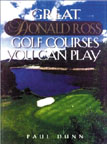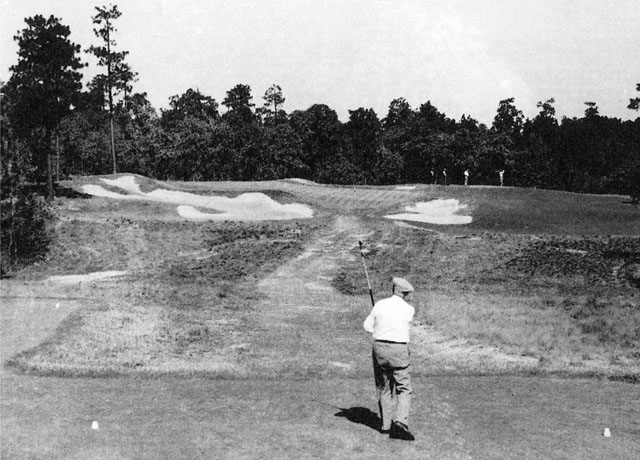|
Donald
James Ross 1872–1948

We’ve
all experienced the disappointment of watching Antiques Road
Show when a suspected Tiffany lamp shade believed worth $150,000
turns out to be worth only $500. Like precious antiques, many
venerable golf courses are also not what they appear to be. I
discovered that when researching 326 golf courses located in
the United States, Canada, Nova Scotia and Cuba that had been
attributed to Donald J. Ross. Using the Directory of Donald Ross
Golf Courses compiled by W. Pete Jones and edited by Michael
Senew as a helpful resource, I discovered that several courses
given the Ross appellation were not the works of the famed Scot.
That’s not
surprising as most golf courses have no historian keeping records.
Over time members’ memories fade, and sometimes myth and
imagination flourish. There is no law prohibiting a course operator
from attributing his course to a more famous architect than the
actual designer. Many courses lack original architectural drawings.
Club houses frequently burned with all records consumed in the
flames. Some courses had several clubhouses destroyed by fire.
Many had several architects providing design and redesign work
over the years. That’s been true at Pinehurst, where most
recently Ben Crenshaw and Bill Coore are bringing famed Course
No. 2 back to its original Ross design in time for the 2014 US
Opens.
In our book,
Great Donald Ross Golf Courses You Can Play, one course out of
the 100 described has prompted more reader mail and questioning
phone calls than any other. It is the Mayfair Course in Sanford,
Florida.
One reason for
the questions: In Architects of Golf, © 1981, the distinguished
authors Ron Whitten and Geoffrey Cornish attributed Mayfair’s
original design to a contemporary of Ross, Cuthbert Butchart,
(born 1876, Carnoustie, Scotland died 1955). Butchart and Ross
had both competed in the British Open. After the First World
War Cuthbert, who had been interned by Germany came to New York
where he was the resident professional at the Westchester-Biltmore
Country Club. Whitten reiterated that claim in GolfWorld.Com
(February, 2009) writing, “We think the confusion occurred
when the course, (Sanford – later Mayfair) was renamed Seminole
and sold to the owner of the New York Giants baseball team. When
the Giants left for San Francisco, the course was sold again,
and the new owner started advertising that he had a Donald Ross
design. Ross did design Seminole, but its further south in Juno
Beach. We’ve played Mayfair, Mayfair is no Seminole.”
After receiving
many phone calls asking why we attributed Mayfair to Ross, when
it had been earlier attributed to Cuthbert Butchart, I undertook
to delve more deeply into the history of the course.
The first thing
that gets one’s attention is a large metal sign at the course
entrance, which was erected in 1998 by the Seminole County Historical
Commission identifying Donald Ross as the course designer. The
three commissioners who determined Ross designed the course are
dead. They left no records justifying their naming of Ross as
the course designer. The city of Sanford has kept the sign up
because so many course members, residents and officials believe
Ross designed the course.
I’ve always
felt that if such an historic sign were put up in Pinehurst identifying
someone other than Ross as the designer here of Resort courses
there’d be a public outcry. In Sanford when that historic
sign was erected there was no public outcry. A former manager
of he course, whose father and brother-in-law also ran it says
his family always believed it was a Ross venue. Indeed, when
he made modest changes to some of the greens, he made them “turtlebacks,”
in keeping with that Ross design tradition.
Where I think
Whitten and Cornish may have been thrown a curve was when they
studied early 1921 newspaper reports related to the building
of a golf course in Sanford. In one story headlined, “Sanford
Golf Links Have Been Laid Out By The Great Butchart, Who is the
Best in Europe and America” the reporter writes that Butchart
“laid off property of J.D. Hood for the new Lakefront Hotel
Company at Crystal Lake.” When I reviewed all the historic
documents related to Mayfair, I was struck by that key sentence.
Why? Because if you Google the City of Sanford you immediately
see that Crystal Lake is roughly one mile from the location of
the Mayfair Golf Club, formerly known as the Sanford Golf Club.
I think Whitten
and Cornish made an honest mistake. Yes, Cuthbert did lay out
a course in Sanford, but not Mayfair. Indeed the course at the
site Butchart visited briefly was never built. Furthermore, I
have found no evidence that the Mayfair course was ever called
“Seminole” during its entire history. It has either
been known as Sanford or Mayfair. For Mayfair to have been misnamed
“Seminole” would have raised the ire of all members
of that famed Ross architectural achievement.
Old records show
that Syd Chase, the owner of the Citrus groves upon which Mayfair
was built contacted many course architects before any earth was
moved. His brother, Joshua was on the Board of Directors of the
Ross-designed Timuquana Country Club in Jacksonville and considered
Ross America’s foremost course designer. At that time Ross
had spent years building dozens of courses in Florida. My opinion
is that Ross provided design input for Mayfair. He may also have
contributed to the redesign of parts of the course in 1937 under
W.P.A. aegis. Ross built many W.P.A courses.
The majority
of courses designed by Ross were never visited by him in person,
albeit his engineering associates performed supervisory work
at the sites. Was the course originally designed by Cameron Trent
who is described in one newspaper report as the course builder?
That’s highly unlikely. For that to have happened Syd Chase
would have had to disregard the strong warning of Tom Bendelow
that Trent was too young and inexperienced, and the recommendation
of his own brother Joshua, who was currently building a course
in Jacksonville using Ross as architect.
Newspaper reports
of the opening of the course in 1924 fail to identify the course
architect. Tufts Archives records of Donald Ross related to all
the courses he built were destroyed after his death by an assistant
to the chagrin of Richard Tufts his employer. WPA paper records
associated with Mayfair were put on film during World War II
and then lost. Architectural drawings of roughly half of all
Ross-designed courses no longer exist, including any drawings
for Mayfair. But fortunately, much correspondence of Syd and
Joshua Chase has survived and include no letters to or from Cuthbert
Butchart.
In its heyday
Sanford was heralded in national golf publications as a course
of superior quality. It attracted top players and hosted professional
tournaments in the ’50s and ’60s. Typically, the reputation
of courses drawing high press praise stands as testimony to the
course architect. I find it unlikely that Mayfair was a first
effort by an unknown designer, and it was certainly not the work
of Cuthbert Butchart. It deserves to be known as a Donald Ross
creation.
For a detailed
analysis of Mayfair’s unique architectural history read:
Articles, at the website of The European Institute of Golf Course
Architects
The
book, Great Donald Ross Golf Courses You Can Play, 2001 is now
being updated by us under a new title, Great Donald Ross Golf
Courses Anyone Can Play, Rowman & Littlefield, Lanham, MD
to come out in 2015.
In it we will
not be including in Florida’s Ponce de Leon or Punta Gorda,
both no longer in business.
We may also lose
the Roosevelt Memorial course in Warm Spring, GA, which has been
closed, yet the grass is still being cut. Georgia no longer wishes
to run it, and they are seeking a foundation to take it over.
It is the only US course in which a president participated in
the design of the course. It is a 9-holer FDR created for guests
at Warm Springs with Ross doing the architectural work. Today
it is a rehab center amputees.
 Donald Ross at Pinehurst
Donald Ross at Pinehurst

|